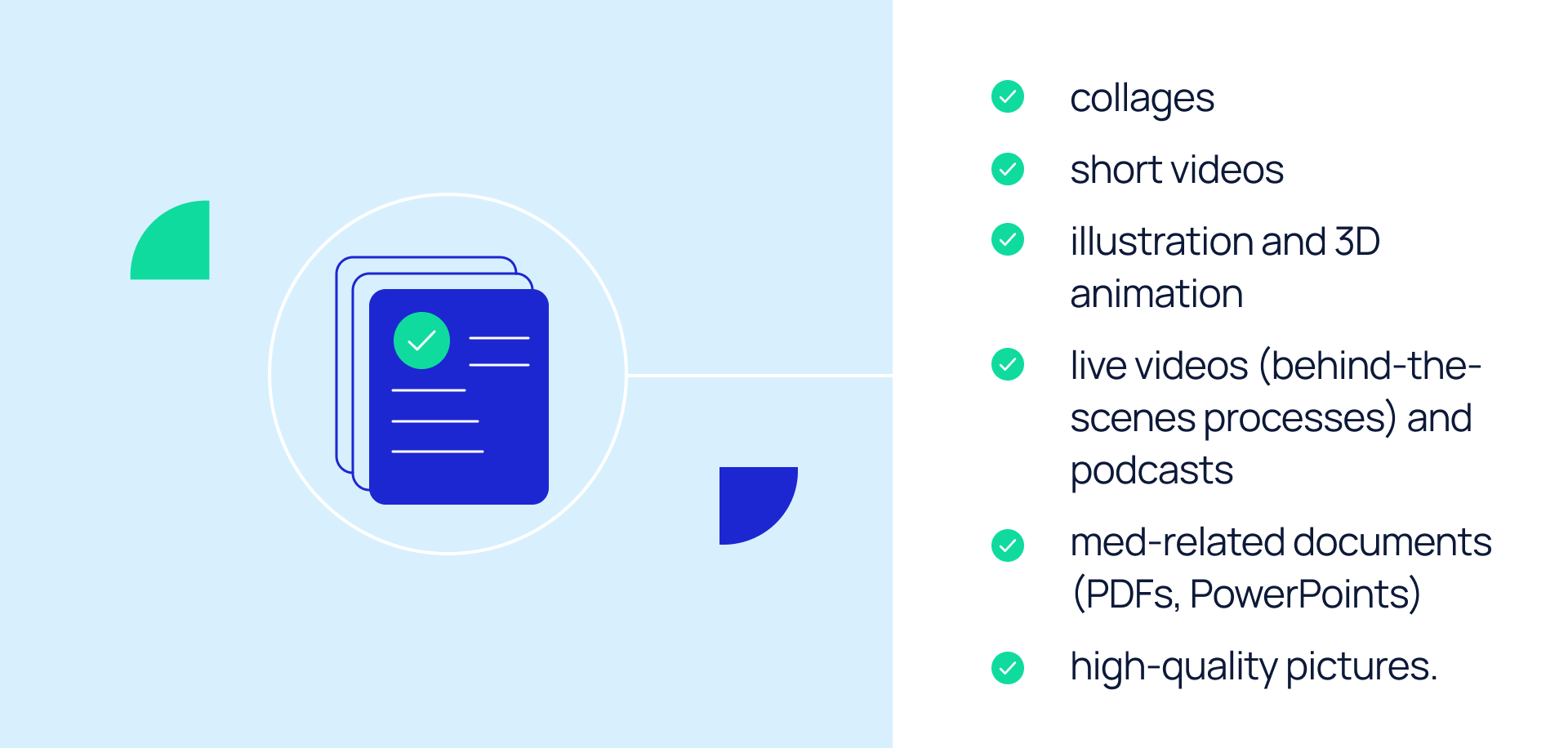How to reach HCPs on social media

As more physicians become digitally savvy, the way to engage them on social media is changing. How to attract the HCP's attention and build trust?
How to catch doctors' attention on social media
Given how physicians are completely wrapped up in work, it might be challenging to attract their attention. However, due to the digitalization of medicine driven by the Covid-19 pandemic, physicians changed their attitudes toward social media, easily adapting SoMe in their clinical practice. Although this offers unprecedented opportunities, pharma companies still find using SoMe to engage with physicians challenging.
Doctors and social media - a “dubious merger”?
Although this might have been the case five years ago, today, it is quite different: 70% of all doctors involved in healthcare are technically and digitally savvy [1]. Indeed, two-thirds of clinicians spend at least an hour on social media and use it for an average of two hours and twenty-two minutes daily, according to Sermo [2].
What do they do there?
Social media platforms have become commonplace in a physician's day-to-day practice. 77% of med-related people use digital channels for personal needs, mostly education [3].
More than 50% of them [4] use SoMe as a tool for both personal and professional needs: sharing ideas with other experts, following the news, researching studies, teaching and training. At the same time, 80% of people on social media, including patients and healthcare professionals (HCPs), use social networks to search for health-related information, as per the source [5].
Social media has also become a single communication point for physicians worldwide: they leverage social channels to connect with colleagues as well as with their family members.
Michael Paul and Mark Dredse note in their Social Monitoring for Public Health book [6]: "Social media have advantages over traditional data sources, including real-time data availability, ease of access, and low cost. Social media allows us to ask questions we never thought possible to answer." Meanwhile, according to Statista [7], SoMe involvement is one of the most popular digital activities. In 2021, 82% of the U.S. population had a social media profile, up 2% from 2020. What's more, that number continues to grow.
The annual Healthcare Marketers Trend Report found that as much as 65% of pharma marketers use social networks in their marketing campaigns to attract HCPs [8]. Given the increased online activity of physicians, implementing a social media marketing strategy could substantially increase your brand awareness. But how to draw them in the right way?
Which social network is yours?
Which of all social network platforms should you choose? Unless you thoroughly study your target audience, you will fail to obtain a clear answer. Generally, one type of content can work well only on one platform. For this reason, relying on all social networks in hopes of achieving outstanding results won't succeed unless you diversify your content. For example, interactive short videos or Reels are good-working content on Instagram but are unlikely to produce any outcomes on LinkedIn. Also, you can post a lot of text content on Facebook, whereas Instagram is more visual-oriented. To conclude, we advise adopting a specific type of content for the particular platform.
Therefore, it is much more effective to find pain points and ways of addressing them. For example, if your audience prefers to search for information in a video format, developing a YouTube-centric engagement strategy could yield positive outputs. Likewise, if Instagram is the preferred social network, focus on eye-catching brand-appropriate visuals.
Try to focus on data-driven content
Social media is full of information, some of which is not always reliable. Given the staggering amount of health misinformation in a constant stream of data, it's more than easy to lose trust.
As noted above, a significant percentage of doctors use the web as a source of med information. To enhance the trust of your target audience, try to provide them with high-quality medical content creation. It is highly desirable that your articles, posts, and other sources of medical information be verified, valuable, and cite credible sources. In other words, generate evidence-based medicine (EBM) content.
The visual element is just as essential
When dealing with content for social media, creating quality visuals comes after the informative text. Thoughtful and well-written text can diminish irrelevant and visually unappealing images. Whether it's Instagram or LinkedIn, the "first the image, then the gist" rule of engagement works the same across all platforms. Users are attracted to the visuals first, and only then are they ready to pore over the text.
Your medical-centric post may not achieve maximum engagement effect without the visual part. For this reason, we advise adding:

Medical content creation requires the involvement of experts in the field. Therefore, it may be appropriate to consider hiring specialists with a medical background or, in the case of video and podcast creation, bringing in key opinion leaders.
Be active and consistent
Social networking is all about close and constant interaction. If you're not prepared to do this every day, it's worth considering whether or not to start at all. Advertising on Facebook can bring you customers, but keeping them interested is entirely dependent on your actions. Attracting potential customers is only a minor part of your business growth.
Each platform supports different levels of interaction. But constant posting, liking, and commenting are the standard set of active social media presence. Here's what else you can add to increase interaction:
-
Finding groups with your target audience
These tactics are more common on Facebook or LinkedIn. By joining medical professional groups, participating in relevant discussions, and sharing your opinion, you attract attention and build trust. Also, you can find medical professionals, decision-makers, medical executives, and other health professionals there.
- Share customer feedback
This tactic works just as well on Instagram. If you already have experience with a medical organization or physician, why not use testimonials from your satisfied customers? For example, if HCPs intend to approach your pharma company, they will most likely check your social media accounts and focus on reviews before engaging. That way it will be easier for them to choose the favor of your company.
And finally, any online audience appreciates attention and care. Thus, try to share useful insights, show your expertise and achievements, ask your audience for opinions as well as create engaging video posts and stories. Last but not least, be honest with your potential customers.
How to start?
Creating a social media campaign to attract doctors is not an easy thing to do. However, if you get it right, social media can be your main source of customers. Implementing a campaign can be easier and faster if you have like-minded people in your arsenal. Building a well-rounded team is a good place to start.
Our Brandmed team, which includes both marketing and medical experts, can help you reach the highest standards. Contact us, and we'll discuss the future transformation of your medical business in more detail.
References:
- World of DTC marketing.com/ HCP’s use of social media, https://worldofdtcmarketing.com/hcps-use-of-social-media-the-good-and-the-not-so-good/, [last accessed: 31.08.2022].
- Sermo/Meet the social savvy physician & learn how to better engage them, https://lp.sermo.com/social-media-report-2022?utm_source=DHCG+newsletter&utm_medium=email&utm_campaign=HCP-social-media-report&utm_id=social+report, [last accessed: 31.08.2022].
- Indegene/The digitally-savvy HCP learnings to engage HCPs around the world more effectively and efficiently, https://indegenerep.s3.ap-south-1.amazonaws.com/indegene/pdf/articles/the-digitally-savvy-hcp.pdf, [last accessed: 31.08.2022].
 Medical Content Creation
Medical Content Creation
 Digital Product Development
Digital Product Development
 Growth Marketing
Growth Marketing
